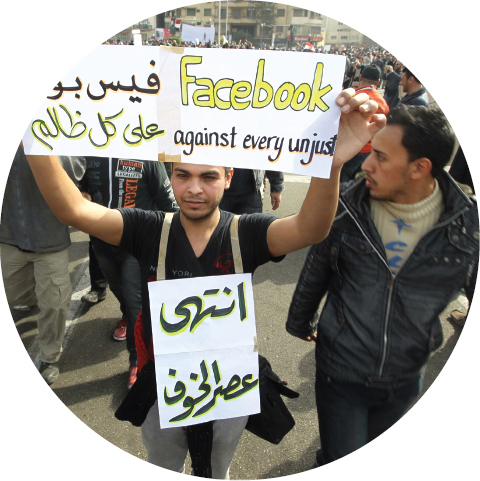Social Media and Democracy
In just a decade, social media have changed the way we consume and relate to media and the way we communicate with others. Social media tools have put unprecedented power in our hands to produce and distribute our own media. We can share our thoughts and opinions, write or update an encyclopedic entry, start a petition or fund-raising campaign, post a video, and create and explore virtual worlds. But social media have also proven to be an effective tool for democracy, and for undermining repressive regimes that thrive on serving up propaganda and hiding their atrocities from view.
The wave of protests in more than a dozen Arab nations in North Africa and the Middle East that began in late 2010 resulted in four rulers being forced from power by mid-2012. The Arab Spring began in Tunisia, with a twenty-six-year-old street vendor named Mohamed Bouazizi, who had his vegetable cart confiscated by police. Humiliated when he tried to get it back, he set himself on fire. While there had been protests before in Tunisia, the stories were never communicated widely. This time, protesters posted videos on Facebook, and satellite news networks spread the story with reports based on those videos. The protests spread across Tunisia, and by January 2011, Tunisia’s dictator of nearly twenty-four years fled the country.

In Egypt, a similar circumstance occurred when twenty-eight-year-old Khaled Said was pulled from a café and beaten to death by police. Said’s fate might have made no impact but for the fact that his brother used his mobile phone to snap a photo of Said’s disfigured face and released it to the Internet. The success of protesters in Tunisia spurred Egyptians to organize their own protests, using the beating of Said as a rallying point. During the pro-democracy gatherings at Tahrir Square in Cairo, protesters used social media like Facebook, Twitter, and YouTube to stay in touch. Global news organizations tracked the protesters’ feeds to stay abreast of what was happening, especially because the state news media ignored the protests and carried pro-Mubarak propaganda. Even though Egyptian leader Hosni Mubarak tried to shut down the Internet in Egypt, word of the protests spread quickly, and he was out within eighteen days after the demonstrations started. In 2013, more protests aided by social media led to the ouster of Mohamed Morsi, Mubarak’s democratically elected successor. In Yemen and Libya, other dictators were ousted. And although Syria’s repressive government was still in power in 2013 after months of protests and fighting, citizens continued to use social media to provide the only evidence of the government’s killing thousands of civilians.
Even in the United States, social media have helped call attention to issues that might not have received any media attention otherwise. In 2011 and 2012, protesters in the Occupy Wall Street movement in New York and at hundreds of sites across the country took to Twitter, Tumblr, YouTube, and Facebook to point out the inequalities of the economy and the income disparity between the wealthiest 1 percent and the rest of the population—the 99 percent.
The flexible and decentralized nature of the Internet and social media is in large part what makes them such powerful tools for subverting control. In China, the Communist Party has tightly controlled mass communication for decades. As more and more Chinese citizens take to the Internet, an estimated thirty thousand government censors monitor or even block Web pages, blogs, chat rooms, and e-mails. Social media sites like Twitter, YouTube, Flickr, WordPress, and Blogger have frequently been blocked, and Google moved its Chinese search engine (Google.cn) to Hong Kong after the Chinese government repeatedly censored it. And for those who persist in practicing “subversive” free speech, there can be severe penalties: Paris-based Reporters without Borders (www.rsf.org) reports that twenty-nine Chinese journalists and sixty-nine netizens were in prison in 2013 for writing articles and blogs that criticized the government. Still, Chinese dissenters bravely play cat-and-mouse with Chinese censors, using free services like Hushmail, Tor, Freegate, and Ultrasurf (the latter two produced by Chinese immigrants in the United States) to break through the Chinese government’s blockade. (For more on using the Internet for political and social statements, see “Examining Ethics: The ‘Anonymous’ Hackers of the Internet”.)